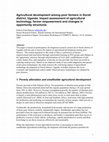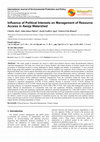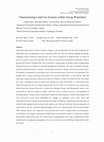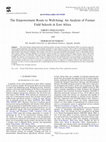Papers by esbern Friis-hansen

Decentralized governance of adaptation to climate change in Africa
This study sought to determine the extent to which local political interests under decentralizati... more This study sought to determine the extent to which local political interests under decentralization influence watershed management. The study was carried out in Soroti, Katakwi and Amuria districts in Eastern Uganda where local governance of watershed resources is being challenged by floods, draughts and mobility of communities. A cross sectional study design using both qualitative and quantitative data collection methods was employed. Factor Analysis and a Logistics Regression Model were used to analyze household survey data gathered from 180 randomly selected households; to determine influence of political factor variables on watershed management. Focus Group Discussions and key informants' interviews were also used to generate qualitative data with the purpose of explaining the relationships among variables and to analyze the extent to which various factors influenced watershed management. From the correlation results the factors that were significantly correlated to watershed management were: Community involvement in implementation was significantly correlated to watershed management (r=0.289, P<0.01), political interests in decisions r=0.187, P<0.05), Reasons for punishment of offenders (r=0.55, P, 0.001. Results from the logit regression showed that dissatisfaction with regulations had an increasing influence on watershed management by 90.8% (OR=1.908, P<0.05). This means that management systems were highly affected by dissatisfaction of communities with rules and regulations. Similarly, community involvement in implementation of rules and regulations significantly influenced watershed management by 3 fold (OR=3.436537, P<0.05). From the focus group discussions and KII interviews the study found that involving communities in policy implementation had led to compromises between communities and watershed governance institutions, which were perceived to have undermined the effective control of access and management of watershed resource use. The study concludes that some political interest factors and divergent activities of local institutions and actors in the watershed constrained the very processes that they should support thereby escalating degradation in Awoja.
HAL is a multi-disciplinary open access archive for the deposit and dissemination of sci-entific ... more HAL is a multi-disciplinary open access archive for the deposit and dissemination of sci-entific research documents, whether they are pub-lished or not. The documents may come from teaching and research institutions in France or abroad, or from public or private research centers. L’archive ouverte pluridisciplinaire HAL, est destinée au dépôt et a ̀ la diffusion de documents scientifiques de niveau recherche, publiés ou non, émanant des établissements d’enseignement et de recherche français ou étrangers, des laboratoires publics ou privés.
Democratic Rural Organizations, 2017
Democratic Rural Organizations, 2017

The purpose of this study was to explore the impact of agricultural extension nonformal education... more The purpose of this study was to explore the impact of agricultural extension nonformal education reforms (1998-2013) in Uganda among extension workers, who were required them to change from a top-down to more participatory educational approach with farmers. Introduction The East African countries have undergone significant reformist policy changes in the agricultural service delivery sector. The introduction of demand-driven advisory services, including strategies of privatization, decentralization, and the promotion of greater participation among farmers in decision-making has had a significant impact on the nonformal education of farmers (Friis-Hansen, Aben, Ameu, & Okoth, 2004). Soroti district in northeastern Uganda offers a good example of a progressive and multi-faceted continuous extension reform undertaken over the last decade and a half. Up to 1995, agricultural extension in Uganda was based on top-down transmission model of nonformal education (Training and Visit). The fi...

This paper is based on participatory development research carried out in Soroti district of Ugand... more This paper is based on participatory development research carried out in Soroti district of Uganda with the aim to assess the impact of agricultural development among poor farmers. The central argument in this study is that a combination of farmer empowerment and innovation through experiential learning in FFS groups and changes in the opportunity structure through transformation of LGA staff, establishment of subcounty farmer fora, and emergence of private service provider, has been successful in reducing rural poverty. Based on an empirical study of successful adaptation and spread of pro-poor technologies, the study assesses the well-being impact of agricultural technology development in Soroti district, Uganda. It further analyzes the socioeconomic and institutional context under which pro-poor technologies are adopted by poor farmers. 1. Poverty alleviation and smallholder agricultural development Poverty prevails in Sub Saharan Africa. The proportion of absolute poor people in...

The Journal of Agricultural Extension, 2018
The purpose of this study was to explore the impact of agricultural extension non-formal educatio... more The purpose of this study was to explore the impact of agricultural extension non-formal education reforms (1998-2013) in Uganda among extension workers, who were required them to change from a top-down to more participatory educational approach with farmers. While extension reform has been subject to several studies, little is known about the professional and personal transformative effects of such reforms on staff. A major challenge for the extension staff to adapt to is the shift as their role and actions became more accountable to farmers. Extension workers were found to experience disorientating dilemma in terms of being both accountable to and sharing decision-making with farmers. At the personal level, the study found that the change in the relationship between extension workers and farmers also had an impact on the household gender relations of the extension workers.
Decentralized governance of adaptation to climate change in Africa, 2017
This chapter aims to identify the drivers behind climate change policies, the intentions for thei... more This chapter aims to identify the drivers behind climate change policies, the intentions for their implementation, and the balance between national and subnational administrative levels with regard to control over finance, decision making and action. This chapter first traces the links between the international climate change agenda and policy developments in Africa. This chapter then examines the governance mechanisms associated with national climate change policies in Africa. The chapter analyses rural climate change adaptation using the principle of subsidiarity. The chapter ends by assessing the balance between decision making and implementing power between national and subnational government institutions.
Prosperity in Rural Africa?, 2021
When the author of this chapter first visited the region he encountered a place that was characte... more When the author of this chapter first visited the region he encountered a place that was characterized by very high levels of poverty. These villages had not been able to benefit from state investment in maize production. However, changes in agricultural production, migration of people outside the area, and remittances, and in particular the explosion of tree farming, tomatoes, and potatoes in a relatively rich area, combined with infrastructural improvements, have been transformative. Change here has been driven by a mutually interlinked set of processes entailing agricultural transformation involving changing farming and rural transformation in a changing rural economy. This is visible in changes to asset ownership as well as relational and social well-being.

All rights reserved Manufactured in the United States of America September 2008 This volume is a ... more All rights reserved Manufactured in the United States of America September 2008 This volume is a product of the staff of the International Bank for Reconstruction and Development/ The World Bank. The findings, interpretations, and conclusions expressed in this paper do not necessarily reflect the views of the Executive Directors of The World Bank or the governments they represent. The World Bank does not guarantee the accuracy of the data included in this work. The boundaries, colors, denominations, and other information shown on any map in this work do not imply any judgment on the part of The World Bank concerning the legal status of any territory or the endorsement or acceptance of such boundaries. The material in this publication is copyrighted. Copying and/or transmitting portions or all of this work without permission may be a violation of applicable law. The International Bank for Reconstruction and Development/ The World Bank encourages dissemination of its work and will normally grant permission to reproduce portions of the work promptly.

International Journal of Environmental Protection and Policy, 2018
This study sought to determine the extent to which local political interests under decentralizati... more This study sought to determine the extent to which local political interests under decentralization influence watershed management. The study was carried out in Soroti, Katakwi and Amuria districts in Eastern Uganda where local governance of watershed resources is being challenged by floods, draughts and mobility of communities. A cross sectional study design using both qualitative and quantitative data collection methods was employed. Factor Analysis and a Logistics Regression Model were used to analyze household survey data gathered from 180 randomly selected households; to determine influence of political factor variables on watershed management. Focus Group Discussions and key informants' interviews were also used to generate qualitative data with the purpose of explaining the relationships among variables and to analyze the extent to which various factors influenced watershed management. From the correlation results the factors that were significantly correlated to watershed management were: Community involvement in implementation was significantly correlated to watershed management (r=0.289, P<0.01), political interests in decisions r=0.187, P<0.05), Reasons for punishment of offenders (r=0.55, P, 0.001. Results from the logit regression showed that dissatisfaction with regulations had an increasing influence on watershed management by 90.8% (OR=1.908, P<0.05). This means that management systems were highly affected by dissatisfaction of communities with rules and regulations. Similarly, community involvement in implementation of rules and regulations significantly influenced watershed management by 3 fold (OR=3.436537, P<0.05). From the focus group discussions and KII interviews the study found that involving communities in policy implementation had led to compromises between communities and watershed governance institutions, which were perceived to have undermined the effective control of access and management of watershed resource use. The study concludes that some political interest factors and divergent activities of local institutions and actors in the watershed constrained the very processes that they should support thereby escalating degradation in Awoja.

Energy and Earth Science, 2019
This manuscript analyses trends in land use changes in Awoja Watershed with the aim of exploring ... more This manuscript analyses trends in land use changes in Awoja Watershed with the aim of exploring the underlying causes of degradation in this watershed within the context of frequent draughts and floods. Changing trends of land use characteristics were used as indicators of ineffectiveness of control of access to resource use in the watershed. The study was carried out in the districts of Katakwi, Amuria and Sorotiin Eastern Uganda where the watershed is experiencing increasing trends of degradation despite the presence of elaborate watershed management institutions. The study used Remote Sensing, and focus group discussions to acquire relevant data on land use changes and their perceived causes. Perceptions of respondents on the effectiveness of the local governance processes were generated. The findings show increase in built-up areas from 0.21% between 1986-1996; to 3.28 between 2006 and 2016 and a notable decrease in forest cover from 107.48 Km2 in 1,986 to 6.94 Km2 by 2016. The...
Democratic Rural Organizations, 2017

Decentralized governance of adaptation to climate change in Africa, 2017
This book comprises 13 chapters divided into four sections. The first section explores the cross-... more This book comprises 13 chapters divided into four sections. The first section explores the cross-sectorial aspects of climate change governance, with a focus on the disconnect between the central and subnational levels of governance and on how climate change has become a contested policy arena. Section 2 explores three different empirical experiences by engaging with the subnational level of governance and using a central government-governed approach, an international non-governmental organization (NGO)-facilitated approach, and a local government-driven approach. Section 3 takes a political ecology view of climate change adaptation in rural areas and seeks to understand the dynamics of such adaptation where governance structures are weak or absent. Section 4 discusses two new trends that are under-explored in the climate change literature, namely mobility and regional agricultural trade. Finally, a concluding chapter seeks to draw conclusions across the rich empirical material in t...
I am also grateful to the many persons within the industry and ministries who have taken time for... more I am also grateful to the many persons within the industry and ministries who have taken time for interviews. Last but not least, I am thankful for the interest and patience shown me by the 70 communal households followed during the research period. Despite these many contributions, I alone am responsible for the views expressed and for those deficiencies which may remain. Copenhagen, February 1991 Esbern Friis-Hansen The Seed Coop has 23 appointed distributors, who handle all seed sales for the Seed Coop outside its own retail sales outlets in Harare and Chinoye. These fall in four groups: a. National cooperatives b. Community cooperatives c. National wholesales d. Wholesalers within a given geographical area. Friis-Hansen. 1990. Seed use and farming systems in Zimbabwe-two case studies. Paper presented at ZIDS
IOP Conference Series: Earth and Environmental Science, 2009
Price: DKK 50.00 (VAT included) DIIS publications can be downloaded free of charge from www.diis.... more Price: DKK 50.00 (VAT included) DIIS publications can be downloaded free of charge from www.diis.dk Hardcopies can be ordered at www.diis.dk This report is part of the Research and Communication Programme (ReCom) on international development cooperation, funded by Danida (Danish Development Agency) and Sida (Swedish Development Agency), and undertaken by a number of institutions including UNU-WIDER and DIIS. For more information on the programme, please see http://recom.wider.unu.edu/ and http://www.diis.dk/recom. The analysis and conclusions in the report do not necessarily reflect the views of any of these institutions and are the sole responsibility of the author(s).

World Development, 2012
The study explores empowerment and well-being related outcomes of Farmer Field Schools (FFS), an ... more The study explores empowerment and well-being related outcomes of Farmer Field Schools (FFS), an extension approach that has gained popularity with agriculture development programs in many African countries. This is done by examining the empirical relationships between FFS participation and increased well-being; as well as FFS participation and empowerment; and finally between empowerment and enhanced well-being. Data analysis from the two thousand household questionnaires show a relationship between these aspects, despite contextual differences in the three countries studied. It is thereby argued that there could be scope to talk about an empowerment route to well-being. The paper further suggests that the most significant impact of FFS could be viewed in terms of building the capacity of local people to make choices and make decisions that ultimately lead to increased uptake of agricultural innovations, access to services, and market access as well as collective action. A major conclusion of the study is that agricultural development programs should focus more on processes of empowering farmers as opposed to technical solutions that characterize most programs, in order to create an appropriate mix of technological and social advancement for a development process that is sustainable in nature.

Uploads
Papers by esbern Friis-hansen